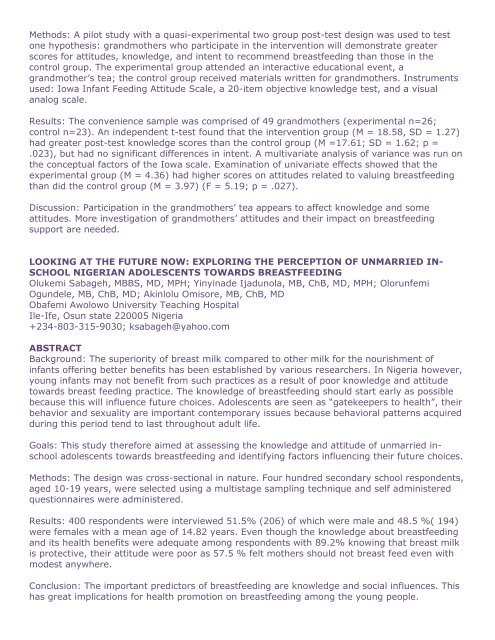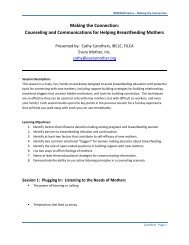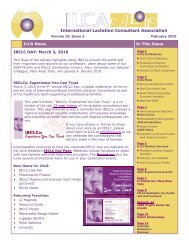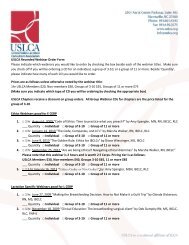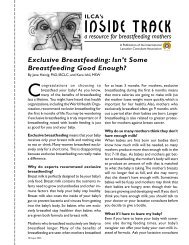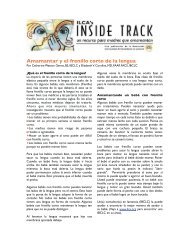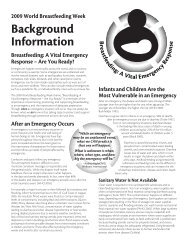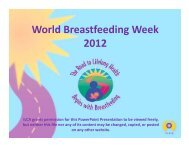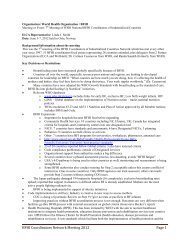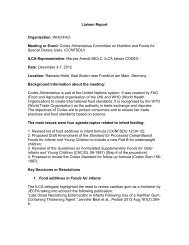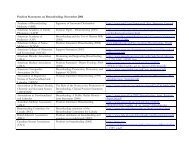2010 - International Lactation Consultant Association
2010 - International Lactation Consultant Association
2010 - International Lactation Consultant Association
You also want an ePaper? Increase the reach of your titles
YUMPU automatically turns print PDFs into web optimized ePapers that Google loves.
Methods: A pilot study with a quasi-experimental two group post-test design was used to test<br />
one hypothesis: grandmothers who participate in the intervention will demonstrate greater<br />
scores for attitudes, knowledge, and intent to recommend breastfeeding than those in the<br />
control group. The experimental group attended an interactive educational event, a<br />
grandmother’s tea; the control group received materials written for grandmothers. Instruments<br />
used: Iowa Infant Feeding Attitude Scale, a 20-item objective knowledge test, and a visual<br />
analog scale.<br />
Results: The convenience sample was comprised of 49 grandmothers (experimental n=26;<br />
control n=23). An independent t-test found that the intervention group (M = 18.58, SD = 1.27)<br />
had greater post-test knowledge scores than the control group (M =17.61; SD = 1.62; p =<br />
.023), but had no significant differences in intent. A multivariate analysis of variance was run on<br />
the conceptual factors of the Iowa scale. Examination of univariate effects showed that the<br />
experimental group (M = 4.36) had higher scores on attitudes related to valuing breastfeeding<br />
than did the control group (M = 3.97) (F = 5.19; p = .027).<br />
Discussion: Participation in the grandmothers’ tea appears to affect knowledge and some<br />
attitudes. More investigation of grandmothers’ attitudes and their impact on breastfeeding<br />
support are needed.<br />
LOOKING AT THE FUTURE NOW: EXPLORING THE PERCEPTION OF UNMARRIED IN-<br />
SCHOOL NIGERIAN ADOLESCENTS TOWARDS BREASTFEEDING<br />
Olukemi Sabageh, MBBS, MD, MPH; Yinyinade Ijadunola, MB, ChB, MD, MPH; Olorunfemi<br />
Ogundele, MB, ChB, MD; Akinlolu Omisore, MB, ChB, MD<br />
Obafemi Awolowo University Teaching Hospital<br />
Ile-Ife, Osun state 220005 Nigeria<br />
+234-803-315-9030; ksabageh@yahoo.com<br />
ABSTRACT<br />
Background: The superiority of breast milk compared to other milk for the nourishment of<br />
infants offering better benefits has been established by various researchers. In Nigeria however,<br />
young infants may not benefit from such practices as a result of poor knowledge and attitude<br />
towards breast feeding practice. The knowledge of breastfeeding should start early as possible<br />
because this will influence future choices. Adolescents are seen as “gatekeepers to health”, their<br />
behavior and sexuality are important contemporary issues because behavioral patterns acquired<br />
during this period tend to last throughout adult life.<br />
Goals: This study therefore aimed at assessing the knowledge and attitude of unmarried inschool<br />
adolescents towards breastfeeding and identifying factors influencing their future choices.<br />
Methods: The design was cross-sectional in nature. Four hundred secondary school respondents,<br />
aged 10-19 years, were selected using a multistage sampling technique and self administered<br />
questionnaires were administered.<br />
Results: 400 respondents were interviewed 51.5% (206) of which were male and 48.5 %( 194)<br />
were females with a mean age of 14.82 years. Even though the knowledge about breastfeeding<br />
and its health benefits were adequate among respondents with 89.2% knowing that breast milk<br />
is protective, their attitude were poor as 57.5 % felt mothers should not breast feed even with<br />
modest anywhere.<br />
Conclusion: The important predictors of breastfeeding are knowledge and social influences. This<br />
has great implications for health promotion on breastfeeding among the young people.


